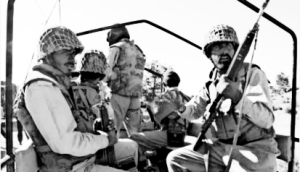
The very fact that the highest military officer addressed a message to the ruling administration is without precedent. Various Pakistani media have openly begun discussing a new crisis in the relationship between the civil administration and the generals; their relationship has already been uneasy in the recent months due to a number of issues. However, the reason for openly warning the federal administration was the decision issued by the Special Court on March 31, 2014 which accused the country’s former president and retired General (former Special Forces) Pervez Musharraf of high treason. This crime carries the death penalty.
The generals intended to demand an explanation. A few days prior to the decision, a meeting was scheduled for April 1, 2014, between the Prime Minister, General Raheel Sharif and the Inter-Services Intelligence (ISI) Chief Director General Lt. General Zaheer ul-Islam. However, the Prime Minister declined to attend the meeting due to “being extremely busy”.
The army was always one of the centers of influence within Pakistan’s political system. As of today, there are three centers of influence: the federal government and the National Assembly (the lower house of parliament), the opposition (the minority in the National Assembly and the majority in the Senate (the upper house of parliament)) and the generals.
The relationship between the generals and the civil administration has always been strained throughout Pakistan’s short history. The military has taken power four times, with the previous coup taking place in 1999. Then Chief of Army Staff General Pervez Musharraf overthrew Nawaz Sharif from his post as Prime Minister (February 1997 to October 1999). The coup was followed by a trial for the former premier, an official sentence of high treason, political exile in 2001 and the return of Nawaz Sharif back to Pakistan only at the end of 2007. In May of 2013, the Pakistan Muslim League (Nawaz) headed by Nawaz won the parliamentary elections for the third time and Muhammad Nawaz Sharif thus took up the post of Prime Minister. During the formation of the cabinet in May-June 2013, Nawaz filled key positions in the government with members from his own party. The post of defense minister was given to a civilian, which breached military traditions. However, as early as August of 2013, the new Finance Minister Ishaq Dar swiftly reassured the generalship that, despite economic difficulties, “the country’s defense will remain the government’s priority”.
Without forgetting his previous strained relations with the general’s office, Nawaz Sharif was not too quick to appoint a new Chief of Army Staff. He was waiting for November 28, 2013, when General Ashfaq Parvez Kayani would complete his term in office as Chief of Army Staff and on November 29, 2013, Nawaz appointed General Raheel Sharif to the now vacant post. As with Pervez Musharraf’s case in 1998, in 2013, Nawaz Sharif also followed his personal preferences and, as such, violated long-standing military tradition of promoting generals along the career ladder. This led to certain dissatisfaction within the military. However, Nawaz was primarily depending on the general’s support.
The sentence for Pervez Musharraf caused a tidal wave of outrage, which simply gained momentum as time went on. Statements that the court’s decision should be carried out swiftly came from various MPs, members of the Pakistan Muslim League (N), in particular, Defense Minister Khawaja Asif, whose criticism was also further supported by Federal Minister for Railways Khawaja Saad Rafique.
The army voiced its support for their former chief. We can only speculate as to the meaning behind the general’s “undue criticism” – has Musharraf’s trial been blatantly politicized, is Musharraf receiving a just trial, and so forth.
There are several overt reasons for the army’s dissatisfaction with the current civil administration (besides the Musharraf case). One of the main reasons is the process of peaceful negotiations between the administration and the prohibited terrorist organization Tehrik-i-Taliban Pakistan (TTP). In December of 2013 on the first day of negotiations, General Raheel Sharif emphasized the government’s full support and agreed, for a time, to halt military operations against the militants in various regions where Pashtun tribes reside on the Afghanistan border. However, he also noted that he will not tolerate any terrorist attacks and will react to any attacks swiftly and effectively.
Yet in February of 2014, armed clashes with TTP militants in the Mohmand Agency led to the death of 23 federal army officers. The government was quick to accuse the army of being the first to use force during the days of negotiations. The generals then stated their demands – a ceasefire beginning on April 1, 2014 (which has been breached by the militants multiple times). The army’s discontent led to the government’s decision to free 16 arrested TTP militants. Henceforth, all failures during negotiations and any breach of the ceasefire were blamed on the army.
To be continued.
Natalia Zamarayeva, PhD in History, Senior Research Fellow, Department of Pakistan at the Institute of Oriental Studies in the Russian Academy of Sciences, exclusively for the online magazine “New Eastern Outlook”.
